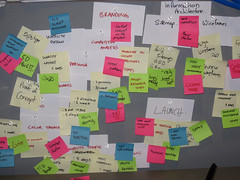 Image by VFS Digital Design via Flickr Image by VFS Digital Design via Flickr |
| Agile But Fragile - The "Uncompany" |
A natural extension of the growing culture of independent contractors, consultants, and project management teams -- enhanced by an accelerating rate of technological change and the growing tendency for structural flexibility (sometimes a euphemism for fiscal non-commitment) is leading industrialized society to the "Uncompany."
The Uncompany is centered about a mission or project, and an ad hoc team of independent individuals from various disciplines is assembled through various recruitment resources specifically to participate in the planning, implementation, management and achievement of a narrowly-defined objective. When the objective is attained, the team is disbanded, leaving the Uncompany lean and mean, with limited fixed or long-term obligations to the individual participants.
Sidebar: For those of you Agile Advocates (i.e.,technologically-oriented Project Management Professionals), here's the futurescape of this ad hoc trend [you'll appreciate the pun]; These Uncompanies will be increasingly Agile, but increasingly Fragile.
Project Management, carried to the impersonal extreme, where every individual team member is a free agent without a permanent alliance to the client company, is a likely future for entrepreneurial companies, and for larger companies wishing to develop new, innovative products and services without a commitment to the persons involved. Contractors are "retained as needed." Long-term fixed costs are minimized to the sponsoring client, but that same client will have to pay a premium in the shorter-term to hire a band of free agents.
A slightly dated article excerpt follows from our friends at BigThink. It is indeed though-provoking. Please read it , and then hit that "Back Button" in the upper left-hand quadrant of your browser -- I'll be eagerly awaiting your return.
| From The Big Think Daily Ideafeed 25 October, 2011 |
| IT MANAGEMENT Crowdsourcing the Future for IT Departments |
| Dell predicts that IT managers will move to the sort of model that film studios use: big temporary teams that come together to solve a problem then disband. |

---------------
While the above article is speaking of this phenomenon of "hit-and-run" meets "non-commitment" (my simplified view, perhaps too-infused with my knowledge of behavioral and industrial psychology) as it relates to IT functions, it can easily be extended to rent-a-CFO services, design services, and most any type of function which can be clearly defined in a context independent of a going concern creating careers as well as stakeholder value.
It brings to mind a construction crew...on location for several months, and then disbanded when the project is complete. Or a put-together band, comprised of musicians who are individually competent, but have not rehearsed together...they don't have the relaxed spontaneity and telepathy effect associated with a practiced band.
This puts the burden of self-branding and self-promotion upon professionals as individuals. It also makes each individual an enterprise or entity unto himself or herself. A byproduct of this trend might just be an increase in placements for Project Managers and expert technologists, and a coincident increase in placement fees for management recruiters and 'headhunting' firms.
While this seemingly benefits these Uncompanies from a long-term cost structural standpoint, it also reduces inducements for this new sea of independent agents to fully dedicate themselves to the business (or contract) at hand -- they will have to be thinking about their next placement in an insecure economic and employment environment. This lack of full focus and loss of a loyalty factor may create a decline in team productivity. There's not enough truly at stake except for an assignment for each player on the pick-up team.
Another disbenefit to both clients and the projects involved is the lengthening of the learning curve of each of the team members simply because they have not necessarily worked with their teammates before -- this Human Factor cannot be ignored. Human beings forge intuitive and synergistic bonds through the experience of working together on a number of projects or missions. There is no substitute for this interaction and the learning which it facilitates. This management configuration (I'll call it "a confederation of strangers") is additionally challenged by the lack of shared experience in a working environment together. This adds an additional element of trial and error as well as a communications handicap to each undertaking.
I do believe that many industrialized economies are headed in this direction, and that each free agent will have to become very proactive in terms of networking and a form of survivalist entrepreneurship. But the ultimate result will, after a run of several years, shift this new paradigm back in favor of the older one -- the one that involved careers, colleagues, some elements of stability and consistency and interpersonal bonding. Loyalty and trust, both of which increase productivity and the likelihood of success, have to be developed over time; a series of short-term engagements with different client organizations does not foster this.
The most successful Uncompanies might find themselves naturally 'reverting' to real companies and to becoming ongoing concerns once again.
Douglas E. Castle [http://BusinessAndProjectPlanning.blogspot.com]










No comments:
Post a Comment